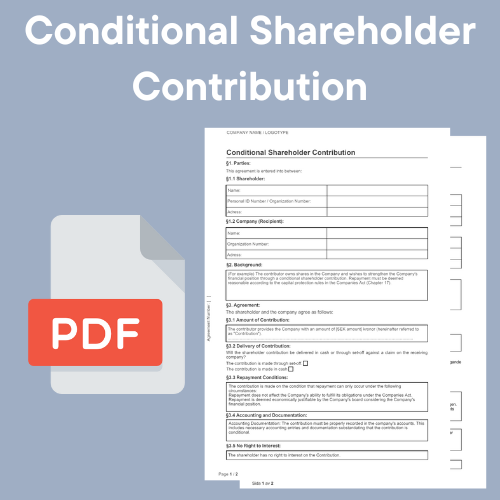FAQ - Shareholder contributions
Share
What is a Shareholder contribution?
Table of Contents
- What is a Shareholder contribution?
- Unconditional Shareholder contribution
- Conditional Shareholder contribution
- Why do Shareholders Give Supplements?
- How are Shareholder Contributions Booked?
- Tax Consequences
- How is a Shareholder Supplement written?
- Frequently Asked Questions and Answers about Shareholder Contributions
- Summary
What is a Shareholder contribution?
A shareholder contribution is a financial contribution that shareholders give to a company to strengthen its capital or cover losses. It is a method of increasing a company's equity without issuing new shares, thereby avoiding the dilution of existing shareholders' holdings. Shareholder contributions can be given in two main forms: unconditional and conditional.
Unconditional Shareholder contribution
An unconditional shareholder contribution means that the shareholder makes no demands for repayment. This means that the capital is permanently added to the company.
Conditional Shareholder contribution
A conditional shareholder contribution means that the shareholder expects to get the amount back if certain conditions are met, for example in the event of a dividend or when the company generates enough profit.
Why Do Shareholders Give Supplements?
There are several reasons why shareholders may consider adding capital to their company:
- Capital strengthening : To strengthen the balance sheet and improve the company's financial position.
- Avoid Bankruptcy : Cover losses or defaults to avoid bankruptcy or liquidation.
- Development Initiatives : Fund expansion, product development or marketing initiatives.
- Security for Loans : Facilitate the company to secure additional loans by improving creditworthiness.
How are shareholder contributions accounted for?
A shareholder contribution is normally booked under the item "Equity" in the company's balance sheet. If the contribution is conditional, this must be noted in the notes to the financial statements to clarify any obligations towards the donor of the contribution.
Tax Consequences
In general, shareholder contributions are not deductible for the donor and are not counted as taxable income for the recipient. It is important to handle the additions correctly in the accounting to avoid problems in the event of a tax audit.
How is a shareholder supplement written?
There are no specific formal requirements for a shareholder contribution, but the documentation should clearly indicate whether it is conditional or unconditional, as well as the conditions for any repayment. Here are some of the most important elements to include:
- Amount : The exact amount being added.
- Type of Supplement : If the supplement is conditional or unconditional.
- Conditions for Reimbursement : If conditional, specify when reimbursement can take place.
- Signatures : All parties should sign for the document to be binding.
Common Questions and Answers about Shareholder Contributions
- Can a Shareholder Addition Change the Shareholder Relationship? No, shareholder contributions do not affect the shareholder relations because no new shares are issued.
- Must Shareholder Contributions be Decided by the General Meeting? A shareholder contribution does not require a formal decision from the general meeting, but should be discussed and documented in the minutes of the general meeting.
- Is Shareholder Contribution Tax Deductible? No, they are not normally tax deductible for the donor.
- Are there risks with shareholder contributions? Yes, the shareholder can lose the contributed amount if the company goes bankrupt or if there are other financial problems.
- How Can Shareholder Contributions Be Used in Financial Strategies? They can be an important part of a financial strategy to strengthen the balance sheet, avoid liquidation and facilitate loans or expansion.
Summary
Shareholder contributions are a powerful tool for increasing a company's capital without affecting the shareholder structure. By understanding the different types and their consequences, shareholders and company management can make better decisions to strengthen the company's financial position.



